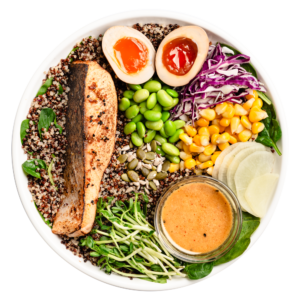Resistant starch is a special type of carbohydrate that has been gaining popularity in recent years. Unlike most carbohydrates that break down into glucose, resistant starch reaches the large intestine without being digested. Once there, it acts as food for beneficial gut bacteria, offering a range of health benefits that go beyond traditional nutrition.
This article explores the uniqueness of resistant starch, its health benefits, and how to incorporate it into your diet. One easy and delicious way to do this is through the diverse, wholesome meal options available at SaladStop!.
What Is Resistant Starch?
Resistant starch is a carbohydrate found in various foods such as underripe bananas, oats, legumes, and certain types of rice and potatoes, especially when cooked and then cooled. Unlike regular starch, it isn’t digested in the small intestine. Instead, it reaches the large intestine, where it ferments and fuels beneficial bacteria in the gut.
When you cook and then cool starchy foods like rice, potatoes, and pasta, they undergo a process called retrogradation. During this cooling phase, the starch molecules rearrange and crystallize, making them resistant to digestion in the small intestine. This is why cooled versions of these foods contain higher amounts of resistant starch compared to their freshly cooked counterparts. Cooling these foods changes their structure, boosting health benefits like better gut health and improved blood sugar regulation.
It is categorized into several types, depending on how it behaves and where it’s sourced:
- RS1: Whole grains and seeds contain RS1, which physically protects them from digestion.
- RS2: Found in raw potatoes, green bananas, and legumes that have a structure preventing digestion.
- RS3: Forms when you cook and then cool starchy foods like rice or potatoes, changing their structure to resist digestion.
- RS4: A chemically modified type of resistant starch, engineered to provide specific health benefits.
The Health Benefits of Resistant Starch
- Improves Gut Health
- It acts as a prebiotic, feeding the good bacteria in your gut. When it ferments in the large intestine, it produces short-chain fatty acids like butyrate, which have anti-inflammatory properties. Butyrate is especially beneficial for colon health, as it helps maintain the integrity of the intestinal lining and reduces the risk of diseases like colon cancer.
- Regulates Blood Sugar Levels
- It helps in regulating blood sugar by improving insulin sensitivity. Unlike traditional starches that break down into glucose, resistant starch does not cause a spike in blood sugar levels. This makes it an excellent addition to the diet for individuals managing diabetes or prediabetes. Research has shown that incorporating resistant starch into meals can help improve post-meal blood sugar regulation.
- Promotes Satiety and Supports Weight Management
- It plays a key role in helping you feel fuller for longer, making it a great tool for weight management. Because it takes longer to digest, it promotes a prolonged feeling of satiety, reducing the likelihood of overeating or snacking between meals. Additionally, resistant starch is lower in calories compared to fully digestible starch, making it a smart choice for those looking to maintain or reduce their calorie intake.
- Supports Colon Health and Reduces Cancer Risk
- The short-chain fatty acids produced during the fermentation of resistant starch help maintain colon health. They serve as a source of energy for colon cells and help reduce inflammation. Early studies suggest that butyrate’s anti-inflammatory effects may help lower the risk of colon cancer, though researchers need to confirm these findings.
- Enhances Fat Oxidation and Metabolic Health
- One of the more exciting benefits of resistant starch is its ability to increase fat oxidation. This means that consuming resistant starch can promote fat burning and may enhance overall metabolic health. As a result, resistant starch is a valuable addition to the diets of athletes and individuals looking to improve body composition.
How to Add Resistant Starch to Your Diet
Adding resistant starch to your meals can be as simple as including foods like green bananas, beans, and cooled potatoes or rice. One convenient and delicious way to enjoy the benefits of it is by choosing thoughtfully crafted meals like those at SaladStop!.
For example, the Harvest Bowl at SaladStop! is a fantastic way to enjoy a balanced mix of Sous-vide chicken, organic wild rice, kale, feta, roasted sweet potatoes, roasted Brussels sprouts, red apple, toasted almonds, and a flavorful Truffle Balsamic Vinaigrette. This bowl not only provides a variety of textures and flavors but also offers digestive and metabolic benefits. The organic wild rice and roasted sweet potatoes, in particular, are great sources of resistant starch, especially when cooked and cooled.
Not only does the Harvest Bowl provide a well-rounded meal that keeps you full and energized, but it also offers the digestive and metabolic benefits that come from resistant starch. Whether you’re looking to improve your gut health, regulate blood sugar, or support weight management, the Harvest Bowl is a delicious and convenient way to reap these benefits.
Resistant starch is a nutrient powerhouse that offers a wide range of health benefits, from enhancing gut health to aiding in weight management, supporting blood sugar regulation, and promoting fat oxidation. Incorporating it into your diet can be a simple and effective way to boost overall well-being.
By adding more resistant starch-rich foods like legumes, green bananas, and cooled rice or potatoes to your meals, you can start enjoying these benefits today. For a convenient and tasty option, try SaladStop!’s Harvest Bowl. With its combination of nutritious ingredients, it offers a delicious way to incorporate resistant starch into your diet while enjoying a filling and satisfying meal. Try the Harvest bowl now!




